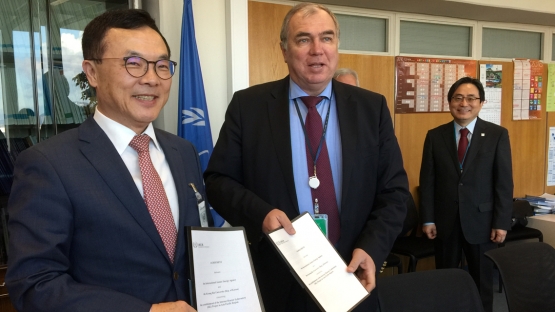An agreement signed today in Vienna will strengthen IAEA’s efforts to offer training on the use of research reactors to students in Asia and the Pacific who do not have access to a facility in their own country.
Under the agreement, the Research and Education Center of the Kyung Hee University in Seoul, Republic of Korea, will perform and broadcast various research reactor experiments to higher education institutions in other Member States.
The IAEA’s Internet Reactor Laboratory (IRL) project, launched in 2014, already covers several countries in Africa, Europe and Latin America and the Caribbean.
“Research reactors are very effective tools for capacity building in the nuclear sector,” said Mikhail Chudakov, IAEA Deputy Director General and Head of the Department of Nuclear Energy. “The addition of the Kyung Hee University as a host will help countries develop national nuclear science and technology programmes.”
Institutions from several countries have already shown interest in joining the project as recipients, in the period from 2018 to 2023.
“We hosted 520 people from various countries in the past 10 years for hands-on training courses,” said Whang Jooho, Vice President of the Kyung Hee University, which operates the University’s AGN-201 research reactor. “With the increase of interest in nuclear power programmes in the region, the demand for nuclear education is growing. The IRL project will help us to efficiently respond to this demand both nationally and internationally.”
IRL is mainly intended for nuclear engineering and nuclear physics students, who otherwise would not have an opportunity to get insight into the practical aspects of reactor physics and its operation. IRL experiments and exercises can also be tailored for nuclear professionals.
The IRL works by giving access to view reactor experiments via an internet link. Using hardware and software installed in a research reactor in the host state, information is sent over the internet to the guest institution, where a real-time display of the reactor’s control room is visible to students. Using video conference equipment, students at the guest institution can interact with lecturers and operators in the reactor control room and direct the lecturer of the host reactor to conduct practical experiments.
Experiments typically include neutron flux monitoring, critical experiment, reactor start-up, control rod calibration, temperature coefficient measurement, and study of the reactivity effects of devices or materials inserted in the reactor core.
The Reactor Research and Education Center from the Kyung Hee University joins two other IRL hosts: ISIS research reactor at the Saclay research centre of the French Alternative Energies and Atomic Energy Commission (CEA) in France and the RA-6 research reactor at Argentina’s National Atomic Energy Commission’s Bariloche research centre. A host reactor in Africa is also expected to join in 2018; currently, African Member States receive the service from CEA-ISIS reactor.







